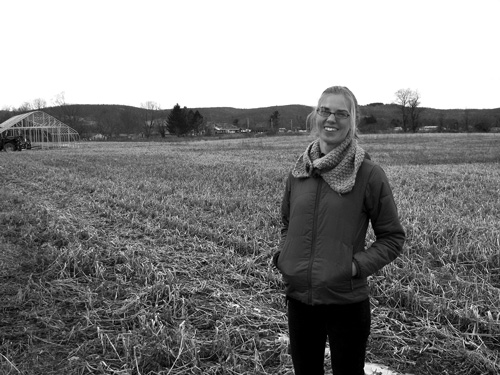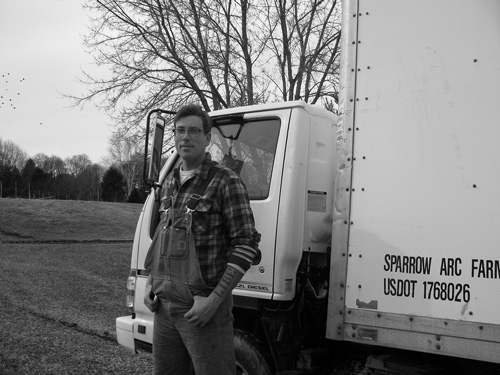News
A new model for saving farmland
Investor group plans agricultural center in Columbia County
By JOHN TOWNES
Contributing writer
COPAKE, N.Y.
A large tract of open land in the central hamlet of Copake, once the proposed site of a controversial affordable-housing development, has now been earmarked for preservation as working farmland.
The 122-acre property, a short distance off Route 22 and just behind the homes that line the northwest side of town’s main street, was recently purchased by Farmland Renewal LLC, a partnership of 22 investors, most with local ties. Farmland Renewal closed on the $650,000 deal in December, and the group is finalizing the purchase of a nearby parcel of 75 acres.
The organization is calling the combined properties the Copake Agricultural Center, and it has already negotiated long-term leases with three small farm businesses that will cultivate individual sections of the property, beginning this spring, using sustainable agricultural methods.
The project will test an emerging strategy of using private investment capital to preserve farmland and make it available to farmers on affordable terms. The Copake Agricultural Center also is expected to have an educational component, and its backers hope it will serve as a model for similar projects around the Northeast.
The 122-acre parcel that changed hands in December previously was owned by Housing Resources of Columbia County Inc. The nonprofit agency bought the land in 2004, also for $650,000, and later proposed building a 138-unit mixed-income housing development there. That effort failed because of financing issues and strong opposition from townspeople who objected to its size and said it would overwhelm the rural community. Housing Resources put the land back on the market three years ago.
The formation of Farmland Renewal and the new Copake Agricultural Center was spearheaded last year by Northeast Farm Access, an organization based in Keene, N.H., that is working to preserve farmland and bolster regional food sources throughout New England and neighboring sections of New York.
“Our goal is to combine social investment and the entrepreneurial activities of farmers to fill a gap in the strategies that have been available until now,” said Robert Bernstein, the founder and director of Northeast Farm Access. “There is economic value in farmland that is used for agriculture -- if it can be structured as an investment that has benefits for all of the participants.”
One of the primary threats to farmland, he explained, is the fact that farming is less profitable than other uses of land, with the result that prime farming tracts are often lost to housing and commercial development. In addition, the price of land suitable for agriculture is often far higher than most small-scale farmers can afford, especially if they’re just starting out. As a result, it is difficult for people to enter farming or to gain equity and grow.
The strategy of Northeast Farm Access is to use investment capital to create situations that enable independent farmers to lease farmland at a price that allows them to establish profitable agricultural enterprises and earn a reasonable livelihood.
Although a partnership like Farmland Renewal LLC is intended to be profitable for the investor-owners of the land, it is based on the concept of “social investment,” which is a hybrid of capitalism and philanthropy. This essentially means that the investments earn money if they’re successful, but they’re oriented toward achieving other social goals.
“The benefits for the investors in this are a modest financial return and the knowledge that they are helping to protect farmland, support agriculture and increase regional food sources and other worthwhile goals,” Bernstein said.
A model for future projects
Bernstein has long been involved in community-oriented development activities, including affordable housing and land conservation. He previously founded and headed an organization called Land for Good.
Last year, he established Northeast Farm Access as a new organization to focus on preserving working farmland. The organization serves as a consultant to identify sites, assemble investors and provide expertise for projects across New England and eastern New York.
Bernstein works for Northeast Farm Access full time, along with a core of eight full- and part-time staff members and consultants.
He said Northeast Farm Access is also pursuing about eight other potential projects, although the Copake site is the group’s initial focus.
Although he lives in New Hampshire, Bernstein said he has personal connections with the Hudson Valley and learned of the Copake site through acquaintances.
“The site is a great location for this,” he said. “It has good soil, and the overall situation there is well suited to it. But this can also be done to protect farmland in many different locations. We see the Copake Agricultural Center as a template that we hope will be replicated in other places.”
The investors in Farmland Renewal, he noted, are able to provide expertise and guidance in addition to their financial stake in farmland preservation projects.
“The investors in this include people like chefs, financial professionals and lawyers,” Bernstein said. “They are able to offer a lot of knowledge and help.”
Bernstein said the investments are expected to earn a return of about 2 percent to 3 percent annually.
In addition to income from leases, Farmland Renewal is also negotiating the sale of development rights to the property through a conservation easement with Scenic Hudson, a regional land conservation organization. The proceeds from that sale eventually would be distributed among the investors.
Mixing conservation, economic activity
One of the investors in the project is Ed Herrington, who operates Herrington’s, a wholesale and retail lumber and building-supply business with five locations in the region, including a store just to the north in Hillsdale.
Herrington said he is participating because he sees the goals of Farmland Renewal as a pragmatic form of conservation.
“I had multiple reasons for supporting this,” Herrington said. “I see it as a mechanism that can combine economic opportunities for the region with an assurance that open space will be protected.
“Around here, we’re blessed with natural beauty and land that is still unspoiled,” he explained. “A great way to ensure that open land will remain open is to use it productively. If you use 10 acres for farmland, it protects it as open space while also giving it an economic value.”
Herrington said he also believes Farmland Renewal represents a form of sustainable economic development that is well suited to the times and the region -- and that it reflects the agricultural heritage of Copake.
“Sustainable farming is becoming a real business in the Hudson Valley and in the Berkshires and Connecticut,” he said. “There’s a groundswell of demand for healthy local food, and it keeps gaining momentum.
“There is also more interest among young people in farming,” he added. “You can grow a lot of vegetables on a few acres. So if you make it possible for people to earn a living by doing that, it creates new economic opportunities and jobs that don’t involve sitting in front of a computer all day.”
Finding farmers for land
Last year, to find suitable tenants for the Copake Agricultural Center, Farmland Renewal requested proposals from across the Northeast. To be eligible, farmers had to have experience and be willing to use environmentally sustainable agricultural practices.
“There are incubators that are oriented to new farmers, but that’s not the purpose of this particular project,” Bernstein said. “This is designed to give an opportunity for farmers with experience to take the next step in their growth.”
The organization chose three farmers and set up renewable 30-year leases with each of them. The farmers have the right to use individual sections of the site for cultivation and for related facilities and activities. The assembled property includes existing houses, which the farmers will live in.
The three farm businesses chosen for the project are all relocating to Copake from other regions. They include MX Morningstar, which is operated by Max Morningstar, who moved from another farm he managed in Sudbury, Mass. He grows heirloom and specialty vegetables that are sold at farm stands and other regional outlets.
Sparrow Arc Farm, owned by Matthew Linehan, was formerly located in Maine and grows specialty vegetables, with an emphasis on sales to Boston and other larger markets.
And Tiny Hearts Farm, owned by Luke Franco and Jennifer Elliott, grows flowers and was previously located in Westchester County.
In addition to supporting these farming operations, the Copake Agricultural Center is intended to serve as a demonstration and education center. The property will have fencing, and direct access to the cultivated land will be limited and controlled by the farmers. But the overall site will be open to the public through a system of trails and common areas, including a planned farm stand building.
On another portion of the site, there are plans to also build a “farm-stay” inn where guests will be able to experience the farming environment.
Bernstein said one goal of the project is to enable the farmers to build equity over time.
“The farmers can increase the value of their business in a variety of ways, including the growth of their brand and facilities and improvements they make on their farms,” he said. “They also have the option of eventually investing in Farmland Renewal and becoming a partial owner of the land.”
He said there is also a possibility that at some point the overall structure might be altered to allow the farmers to buy their land outright.
Bernstein said there are other variations of this model that Northeast Farm Access is pursuing in other locations, such as investors buying land and leasing it to individual farmers who have the option of purchasing it on affordable terms in the future.
The concept of using social investment to make farmland affordable is intended to augment other approaches to land conservation and support of farming, he added.
“Government programs and nonprofit philanthropic organizations have an important role, and they have preserved a lot of land -- including farmland,” he said. “But there is a limit to how much they can do. This is a different model that offers an additional way to achieve that goal and protect more farmland.”

